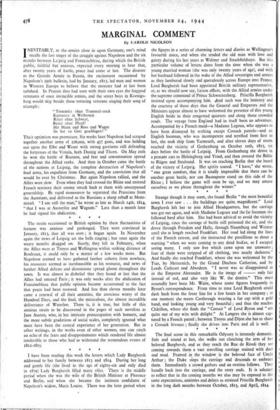MARGINAL COMMENT
By HAROLD NICOLSON
INEVITABLY, as the armies close in upon Germany, one's mind recalls the last stages of the struggle against Napoleon and the six months between Leipzig and Fontainebleau, during which the British public, faithful but anxious, expected every mornng to hear that, after twenty years of battle, peace had come at last. The disaster to the Grande Armee in Russia, the excitement occasioned by Napoleon's 29th bulletin, had by January, 1813, led men and women in Western Europe to believe that the monster had at last been subdued. In Prussia they had seen with their own eyes the haggard remnants of once invincible armies, and the street boys in Koenigs- berg would skip beside those tottering veterans singing their song of triumph:
" Trommler ohne Trommel-stock Kuirassicr in Weiberock Ritter ohne, Schwcrt, Reiter ohne Pferd!
Mit Mann und Ross und Wagen So hat sic Gott geschlagen! "
Their optimism was premature. Six weeks later Napoleon had scraped together another army of 226,000, with 457 guns, and was holding out upon the Elbe and Weser with strong garrisons still defending the fortresses of the Vistula, both Danzig and Thorn. On May loth he won the battle of Bautzen, and fear and consternation spread throughout the Allied ranks. And then in October came the battle of the nations at Leipzig, the complete destruction of Napoleon's final army, his expulsion from Germany, and the conviction that all would be over by Christmas. But again Napoleon rallied, and the Allies were slow. Even when they had crossed the Rhine and entered French territory their enemy struck back at them with unsurpassed generalship. By rapid manoeuvre he separated the Prussians from the Austrians, and delivered to the Russians a sharp rebuff at Mont- mirail. " I am still the man," he wrote as late as March 14th, 1814, " that I was at Austerlitz and Wagrain." Less than a month later he had signed his abdication.


























 Previous page
Previous page